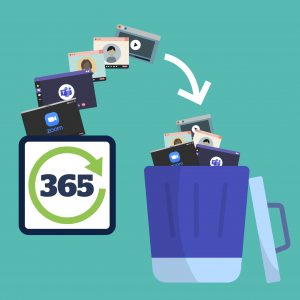If T.S. Elliot has taught us anything, it’s that naming is a difficult matter, It isn’t just one of your holiday games. Naming a thing should be simple enough, but it isn’t. There is so much to consider for both cats, in the case of T.S. Elliot, and for us, in the case of the Email and Messaging Retention Working Group.

In October 2023, UBC will begin automating retention on video content in MS Teams and Zoom
The name should be specific, yet flexible and, if at all possible, the acronym should epitomize the spirit of what we hope to achieve.
The Email and Messaging Retention working group is a cross-campus effort to automate retention rules in UBC systems. I wrote about them in 2021 when we announced the automated destruction of default email folders in FASMail and instant messaging in MS Teams.
We struggle with our name, which is probably…okay entirely, my fault. At first we were called, the Email Retention Working Group (ERWG) when our remit was focused on entirely on FASMail. Then in late 2020, automating the destruction of “chat” in MSTeams came roaring to the forefront. We updated the TORs and added messaging to our name since the work was so similar. Then another system having nothing to do with either email or messaging was brought to us. So, we are at it again, undergoing a name change. The objectives within our Terms of Reference continue to be stable but the name of the working group is just too narrow. UBCO Records Manager, Michael Stewart was kidding when he suggested we adopt a Prince-like symbol and call ourselves the Working Group formally known as… but jokes aside, it is clear that there is both institutional need and community support for the automation of retention rules in systems at UBC.
The work we undertake has substantial upsides for the university. Left unmanaged, data within business systems increases exponentially, and where data accumulates, risk follows, and risk takes a myriad of forms. The university is exposed through the growth of personal or student information (PI) in both business and shadow systems (an example of a shadow system is data downloaded from a system into a spreadsheet, stored on a shared drive then (potentially) forgotten about) which increases the university’s probability of a data breaches. Additionally, UBC has to shoulder the financial consequences of paying for storage and back-ups of expired, obsolete data. One response in mitigating the PI risk is to lock the data down through encryption, which is both reasonable and required, but this practice does not solve the ongoing and unnecessary financial burden of having to store data that has outlived its usefulness. Manually applying the retention schedules to information generally at the university, whether it be on shared drives or in content systems, reduces bulk, but automating retention rules eliminates the bulk, the risk, and the burden placed on the end-user of having to undertake the task themselves. Automating retention within systems without user interaction is, ironically, user-focused because it asks nothing extra of them! Data that is no longer required for university business is eliminated behind the scenes.
Over the holidays, in the dying days of 2022 the Email and Messaging Retention working Group will officially change its name. This time, and let’s hope it’s the last, we are going to focus on the outcome of our work and fingers crossed this lends our name longevity. Personally, I like the sound of Retention Automation Working Group (RAWG). I think it states clearly what we are trying to achieve and the acronym RAWG sounds like a Nordic metal band clashing nicely with our friendliness, while still speaking of our determination.
Current membership includes: Barbara Towell (Chair), E-Records Manager, Records Management Office, University Archives; Scott Baker, Manager, Sensitive Research Advanced Research Computing; Mark Belsito , Manager, Operations Communication and Collaboration Services UBC-IT ; Garry Der, Manager, Audio Visual Support, UBC-IT; Paul Hancock, Legal Counsel, Information and Privacy; Tim Kato , Team Lead, Learning Technology Hub; Mike Nichols, Client Services Manager, Engagement Services, UBC-IT; Michael Stewart, Records Manager, Okanagan Library; Christian Stockman, Information and Security Risk Advisor, Safety and Risk Services; Anthony Winstanley, Director of IT, Faculty of Computer Science.